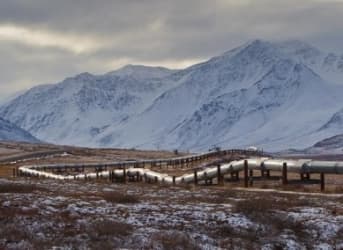The disappointing exploration results in the Chukchi Sea for Royal Dutch Shell was a huge blow to the company, and will set back oil development in the Arctic indefinitely. After spending $7 billion and eight years, walking away with nothing is hard to stomach.
But, Shell can always go elsewhere. Shortly after Shell announced that it was scrapping its entire Arctic Alaska campaign, Reuters reported that Shell won a bid to explore for oil and gas in the Black Sea in Bulgarian waters. An exploration deal could be finalized in October.
So, Shell has other options. Meanwhile, Alaska has to pick up the pieces after Shell’s failed drilling campaign. The state, so dependent on oil and gas for its budget revenues, is facing austere times with the collapse in oil prices.
The Governor is aggressively pushing for the state to take an equity position in a massive natural gas pipeline, a big roll of the dice with taxpayer money. The pipeline would traverse the entire state, carrying natural gas from the North Slope to a yet-to-be-built LNG export terminal in the south. The “must-have” project could cost $45 to $65 billion, and the private sector partners are not pleased with the Governor’s attempts to take a stake in the project, which they say is injecting too much uncertainty into an already risky venture. Related: Fund Managers Have Their Own ‘Black Monday’ Thanks To The Saudis
However, the Governor’s push illustrates the predicament the state faces with dwindling revenues from oil and gas. Alaska was already facing a bleak future before the bust in oil prices. Alaska’s North Slope, where the bulk of the state’s oil production is located, has been in long-term decline, having peaked more than twenty years ago. The fields are mature, and they have been used to feed the Trans-Alaskan Pipeline for decades, which sends oil from the North to the South.

The crash in oil prices since the middle of 2014 has turned the long-term problem of the state’s oil sector into a full-blown crisis. Oil accounts for more than 70 percent of the state’s revenue, so falling production was cutting into the state’s resources for a long time. However, the collapse in oil prices blew massive hole in the budget, with a deficit widening to more than $3.5 billion. Related: Is This The Decade's Most Important Mining News?
The state does have options. It may be forced to tap the Permanent Fund, a fund setup in 1976 to save oil revenues for future generations. The fund now has over $50 billion. Also, there are no income or sales taxes in Alaska, and New Hampshire is the only other state in the U.S. in such a situation. Finally, Alaskan residents get a check from the state each year as part of an oil revenue sharing program. This year was a record year for payments, as every Alaskan resident received a check for more than $2,000.
The state can look to any of these sources for revenues, but tampering with any of them is extremely unpopular, as a recent article in The Atlantic describes very well.
Whatever Alaska comes up with, the solution will probably need to be a permanent one, not a Band-Aid. The state’s oil fields are declining. Even worse, the prospect of replacing those aging fields with new sources of production is suddenly looking less likely. The failure to boost output is symbolized by Shell’s decision to withdraw from the Arctic. The enormous oil and gas reserves located off the coast of Alaska – estimated to be in the range of 30 billion barrels – promised to rescue the state from a future of declining production. But oil won’t be extracted from the Chukchi Sea anytime soon, if ever.
Crucially, Shell’s venture in Alaska was billed as a solution to the declining throughput in the Trans Alaskan Pipeline, which once exceeded 2 million barrels per day but has now fallen to just 500,000 barrels per day. Because Alaska’s oil fields are declining in production, the throughput for the pipeline is also falling by 5 percent each year. As the pipeline’s flow declines, pressure falls and the flow slows down. That presents problems for the pipeline, as water could freeze in the pipeline and corrosion becomes more of a worry. If flows drop below a certain point, the pipeline could theoretically have to shut down altogether. Related: Is This The Mining Equipment Sector’s Last Act?
Alaskan Senator Lisa Murkowski (R) was irate about Shell’s decision to pull the plug on the Arctic, and she pointed the finger at federal regulations.
But for the foreseeable future, the Chukchi Sea won’t be developed. That presents huge challenges to a state so dependent on oil, and one in which oil production is declining. Sen. Murkowski quickly shifted her sights to onshore oil production, calling on the federal government to open up further development in the National Petroleum Reserve, open up development in the Arctic National Wildlife Refuge (a highly controversial issue), extend offshore lease terms, and open up new areas in the Beaufort Sea. With the Chukchi now in the rearview mirror, we can expect a much stronger push for onshore development in sensitive areas.
ADVERTISEMENT
None of these options are easy politically. Even if Alaska can somehow convince the federal government to open up new areas for development, it’s not clear that the oil industry will be willing to invest, given the depressed state of the industry.
Alaskans may need to come to grips with the possibility that the royalty checks may stop coming in the mail or that they might have to pay income taxes.
By Nick Cunningham of Oilprice.com
More Top Reads From Oilprice.com:
- Exxon CEO: Alaska Is Its Own Worst Enemy
- With Shell’s Failure, U.S. Arctic Drilling Is Dead
- What Oil Investors Can Learn From Gold


















